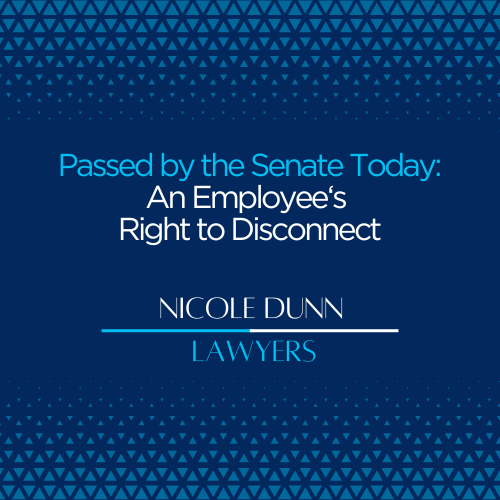Today (8 February 2024), the Fair Work Legislation Amendment (Closing Loopholes No.2) Bill 2023 (the Bill) was passed in the Senate. The Bill amends the Fair Work Act 2009 (Cth) (the FW Act).
Following debate in the Senate on 7 February 2024, the Greens introduced an amendment which provides that employees have a right to refuse to read or respond to communication from their employer or a third party if it that relates to work outside working hours (the Right to Disconnect).
The Bill also introduced, amongst other things:
- minimum standards for gig-economic workers; and
- changes to the way a casual employee can be converted to full/part-time employment.
Given the broad reaching nature of the Right to Disconnect we have chosen to focus on that aspect here.
The Right to Disconnect
Section 333M(1) of the FW Act has been amended to include the following words:
An employee may refuse to monitor, read, or respond to contact, or attempted contact, from an employer outside of the employee’s working hours unless the refusal is unreasonable.
The same right extends to contact from a third party, where the contact relates to work (section 333M(2)).
The restrictions of the Right to Disconnect are not blanket restriction on making any contact with employees outside of their hours of work. Any exercise of the Right to Disconnect by an employee must not be unreasonable.
Section 333M(3) provides some guidance in relation to when a refusal may be unreasonable. The factors to consider include:
- The reason for the contact;
- The level of disruption any contact would have on the employee;
- Whether the employee will be compensated for the contact, e.g. whether there is an on-call allowance or whether they would be paid for the contact;
- The nature of the employee’s role;
- The level of responsibility of the employee’s role; and
- Any personal circumstances of the employee.
The above is not an exhaustive list.
Some practical examples of when the factors set out above may become particularly relevant may include:
- Contacting an employee in the event of an emergency;
- Contacting an employee to cover a roster gap or otherwise change a roster;
- Contacting an employee to perform a welfare check; or
- Contacting an employee during an extended period of leave regarding a return date.
We expect there will be cases in future which will provide further clarity on what is or is not unreasonable contact.
Disputes/Fair Work Commission Jurisdiction
In the event there is a dispute about the Right to Disconnect, the Bill provides that an employee and an employer must first attempt to resolve any dispute at the workplace level.
If the matter is not resolved at the workplace level, either party can apply to the Fair Work Commission (FWC) for an order (see below) or for the FWC to otherwise deal with the dispute.
Section 333P(1) provides that the FWC may make an order where:
- An employee has unreasonably refused to respond to any contact, and there is a risk the employee will continue to do so;
- An employee has reasonably refused contact and there is a risk the employer will take disciplinary action (or other action) against the employee because the employer believes the refusal is unreasonable;
- An employee has reasonably refused contact and there is a risk the employer will continue to require the employee to respond.
If satisfied of a risk as set out in (a) to (c) above, the FWC can make the following order(s):
- an order to prevent the employee from continuing to require the employee to respond to contact;
- an order to prevent the employee from taking action against the employee because of a reasonable refusal; or
- prevent an employer from continuing to require an employee to respond; or
- any other order it considers appropriate, but that does not include an order for payment of money.
These provisions are civil penalty provisions. Accordingly, a failure to comply with an order made by the FWC may result in a civil penalty being imposed.
Application
The Right to Disconnect will be a right of all employees, regardless of whether they are covered by an Award or not, however all Awards will be amended to include a Right to Disconnect term.
When will this come into effect?
The changes will come into effect 6 months after the Bill receives Royal Assent (Commencement).
There has been a temporary adjustment period built into the amendments in relation to small business employers and their employees. The Right to Disconnect will not apply to a small business employer or their employees for a period of 12 months following Commencement.
What Employers Need to Do
Employers should exercise caution when considering whether a refusal is unreasonable, particularly if they intend to impose consequences on the employee for what the employer says is an unreasonable refusal.
With 6 months until commencement, it is prudent for all employers to spend time considering what their current policies and procedures are for contacting employees outside of work hours and the expectations that employees have in that regard.
For businesses wanting to review their contracts or policies in relation to these matters please contact us.
Written by Kate Barter and Nicole Dunn
Disclaimer: This publication has been provided for general guidance only and does not constitute professional legal advice. You should obtain professional legal advice before acting on information contained in this article.

